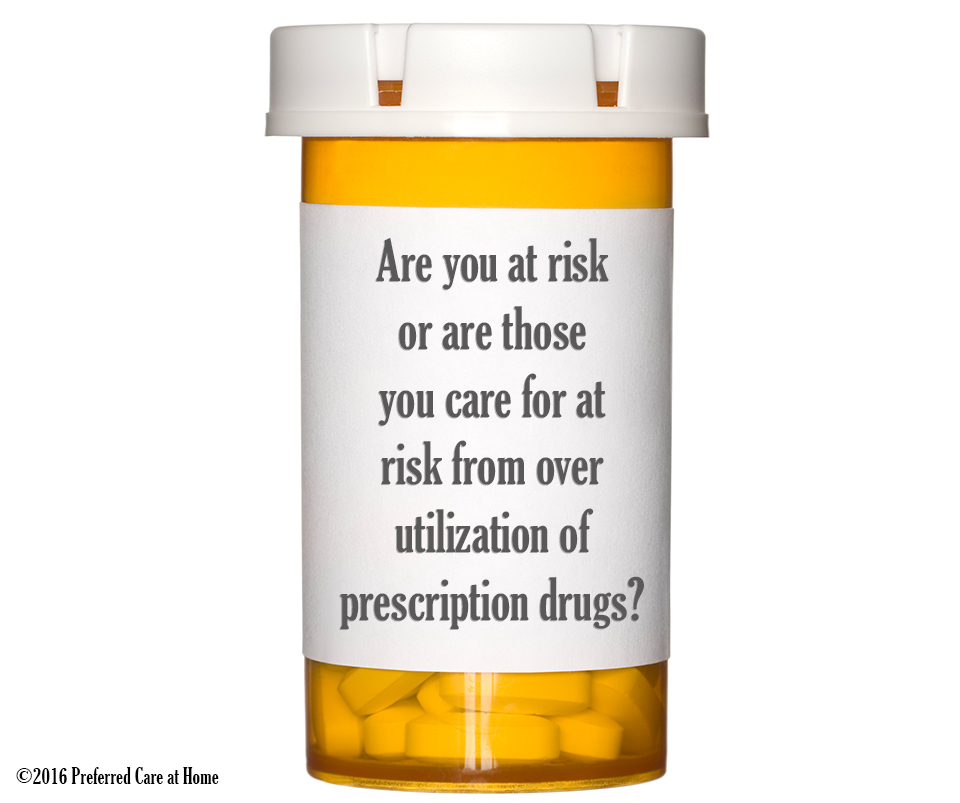Safety and Prescription Drugs
Published May 19, 2016 by Laurie Salmons, RN, BSN in At Home Caregiving, Medication Concerns

In 2014, Americans were written a total of 4.33 billion prescriptions per Mayo Clinic statistics. They also report that the average American is written more than 13 prescriptions a year.
The World Health Organization has found that this number of prescriptions is over nine times the level of prescriptions written in western Europe, which is equivalent to the US in population.
Are you at risk or are those you care for at risk from over utilization of prescription drugs? Medications often provide users with relief from some symptoms but these drugs can also carry a host of health risks and contraindications.
According to a report presented by ABC’s World News Tonight, over 25% of all hospital admissions are related to adverse reactions to prescription drugs! In addition, the Journal of Law, Medicine and Ethics states that pharmaceuticals can be attributed as a leading cause of death for Americans.
In light of these risks, caregivers have an apparent obligation to defend their patients who are usually quick to follow doctors’ orders before asking pertinent questions. In no way, am I suggesting that you take your patient’s pill bottles and dump them all in the trash but what I am recommending is that, as a caregiver, you pay close attention to what is being ordered for your patient and make sure your health care professional has the vital information needed to make decisions.
Caregivers and patients should ask doctors who prescribe these medications some important yet simple questions. Here are some examples:
- What is this medicine for and what will it do for me?
- Are there any non-drug options that I could utilize?
- How long should I take this medication?
- How much should I take and is there a time of day that it should be taken?
- What are the side effects that I might experience from this med?
- What kind of results should I be looking for?
- Will I need any tests to see if this medication is working?
In addition to these sample questions, as a caregiver or patient, ask the physician if there are alternatives to taking these prescribed medications. Here are some examples:
- If I lose weight, will that help me reduce or be able to discontinue this medication?
- Would exercising help me reduce the need for this medication?
- Is there a type of diet, such as vegetarian, that you would recommend for me that would help me eliminate this medication?
- Should I reduce my intake of alcohol or tobacco?
- How can I obtain a better night’s sleep without taking a sleeping pill?
And as always seek advice from professionals that deliver care in the home. These agencies can help you get the answers to some of the important questions or head you in the right direction.
On a previous blog, I recommended developing a Personal Health Record. Find one on the internet that you can use as a template and write these medication questions down.
Always be ready to ask, “How can I do my part? What long term changes can I make in my diet, activity level, and other lifestyle habits that could improve my health and possibly reduce my use of medications?”
I believe if you begin to make these changes, you will feel better, and be glad you are taking control of your health and living a more robust life.
If you have questions about senior home
care services or if you want to start care:
Related Posts

September 26, 2024
3 “Little Things” That Improve Communication Between Caregivers and Loved Ones
Francesca Robinson, MA

October 19, 2023
Preventing Osteoporosis: Essential Tips for Stronger Bones Post-Menopause
R. Bradley Robinson, M.D.

August 4, 2022
Caregiving: Give Yourself Some Credit – You Deserve It!
Laurie Salmons, RN, BSN
Helping seniors age in place, with dignity & grace.